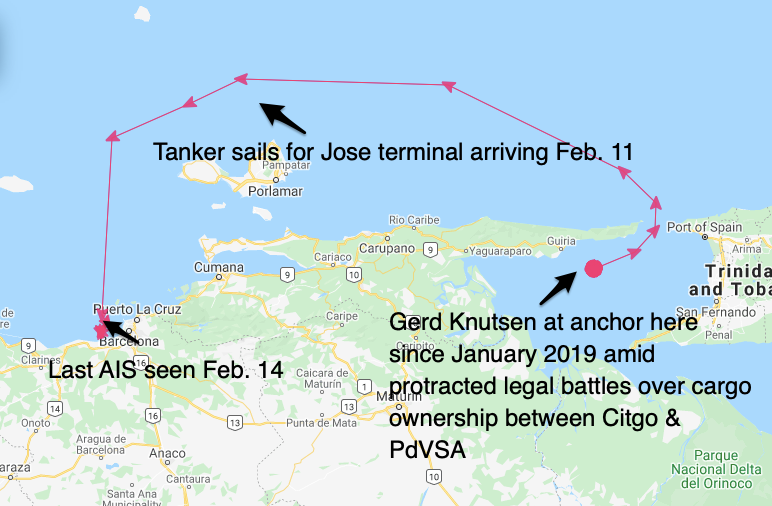Tanker at centre of Venezuela power struggle over crude cargo sails
Protracted legal dispute trapped suezmax tanker Gerd Knutsen in Venezuelan waters for 13 months
Tanker has discharged crude cargo at Jose offshore terminal and left the port, switching off AIS
A SUEZMAX tanker trapped in Venezuela for 13 months after being caught up in protracted legal action in the US appears to have discharged its cargo of crude oil and sailed from Jose terminal.
The 1996-built Gerd Knutsen loaded 1m barrels of crude in January 2019, shortly before US sanctions on Venezuela were extended to incorporate its national oil company, PDVSA.

The cargo had been sold to Citgo Petroleum Corp, the Venezuelan-government owned, US-based owner of three refineries and major fuel retailer.
Since then, the tanker and the crude oil cargo have been at the centre of complex, ongoing legal battles for control of Citgo between ousted directors appointed by Venezuelan president Nicolas Maduro and current directors led by US-endorsed opposition leader Juan Guaido.
“After the US recognised Juan Guaido as the interim president of Venezuela and put full-on sanctions on PDVSA, the Maduro regime would not let the tanker leave its waters,” said Russ Dalen, from Miami-based Caracas Capital in a note to investors on February 13.
“So the Gerd Knutsen sat collecting barnacles in the Gulf of Paria until November, when the Maduro regime decided it was going to board the [tanker] and force her to give back its $57m cargo.
“This prompted the Guaido Board of Directors of Citgo to sue for an emergency restraining order on the former Maduro directors in Delaware.”
This was the location where the ousted board members had unsuccessfully sued the new board members for control of Citgo. On December 17, the restraining order was granted.
The suezmax tanker sailed to the Jose offshore terminal, arriving on February 11, according to satellite-tracking data. The last automatic identification signal was seen at 1841 GMT on February 14, suggesting that the tanker had left the region but did not want its movements further scrutinised.
The owner and operator of the Isle of Man-flagged tanker, Norway-based Knutsen NYK Offshore Tankers, did not respond to requests from Lloyd’s List for comment about the vessel’s movements.
“We reached out to Citgo at the highest levels for confirmation of whether the Gerd was offloading by agreement or by force,” said Mr Dallen, adding that the company did not want to comment.
“The fact that they knew about it and that they have not filed anything in court to stop it suggests that a deal was reached, probably …because the cost of keeping a suezmax tanker and crew stuck in Venezuela for over a year is approaching the full value of the cargo.”

Venezuelan crude exports have plunged amid political and economic turmoil, worsened by longstanding underinvestment in oil infrastructure and unilateral US sanctions on PDVSA, which hampers trading in US-dollar denominated currency.
Shipments tracked in January reached 930,000 bpd in January, according to Lloyd’s List Intelligence data, less than half volumes seen two years ago. Russian oil company Rosneft is selling much of the oil and charters about 80% of tankers exporting from Venezuela, according to Mr Dallen. India and China are now the biggest buyers, after restrictions on sales to the US sidelined Venezuela from its biggest market.

